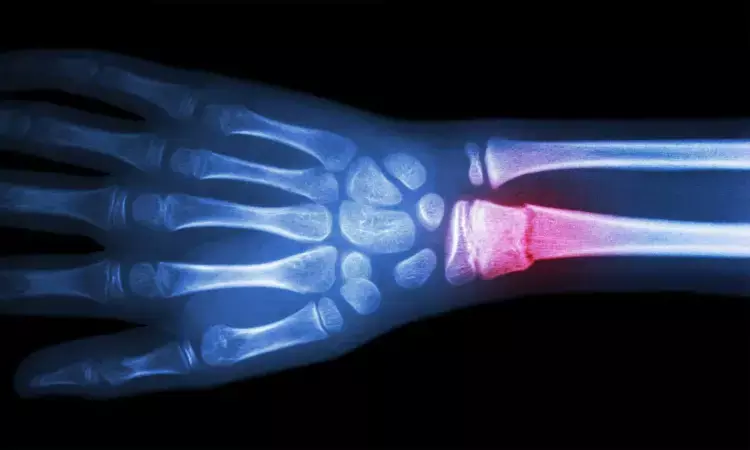- Home
- Medical news & Guidelines
- Anesthesiology
- Cardiology and CTVS
- Critical Care
- Dentistry
- Dermatology
- Diabetes and Endocrinology
- ENT
- Gastroenterology
- Medicine
- Nephrology
- Neurology
- Obstretics-Gynaecology
- Oncology
- Ophthalmology
- Orthopaedics
- Pediatrics-Neonatology
- Psychiatry
- Pulmonology
- Radiology
- Surgery
- Urology
- Laboratory Medicine
- Diet
- Nursing
- Paramedical
- Physiotherapy
- Health news
- Fact Check
- Bone Health Fact Check
- Brain Health Fact Check
- Cancer Related Fact Check
- Child Care Fact Check
- Dental and oral health fact check
- Diabetes and metabolic health fact check
- Diet and Nutrition Fact Check
- Eye and ENT Care Fact Check
- Fitness fact check
- Gut health fact check
- Heart health fact check
- Kidney health fact check
- Medical education fact check
- Men's health fact check
- Respiratory fact check
- Skin and hair care fact check
- Vaccine and Immunization fact check
- Women's health fact check
- AYUSH
- State News
- Andaman and Nicobar Islands
- Andhra Pradesh
- Arunachal Pradesh
- Assam
- Bihar
- Chandigarh
- Chattisgarh
- Dadra and Nagar Haveli
- Daman and Diu
- Delhi
- Goa
- Gujarat
- Haryana
- Himachal Pradesh
- Jammu & Kashmir
- Jharkhand
- Karnataka
- Kerala
- Ladakh
- Lakshadweep
- Madhya Pradesh
- Maharashtra
- Manipur
- Meghalaya
- Mizoram
- Nagaland
- Odisha
- Puducherry
- Punjab
- Rajasthan
- Sikkim
- Tamil Nadu
- Telangana
- Tripura
- Uttar Pradesh
- Uttrakhand
- West Bengal
- Medical Education
- Industry
Abnormal immune suppression linked to poor healing of bone injury: Study

USA: Increased circulating levels of MDSCs and IL-10 (immunosuppressor cells) is associated with poor functional regeneration of traumatic bone injuries, suggests a recent study in the Proceedings of the National Academy of Sciences.
The results suggest that the early systemic immune response to trauma can be helpful in predicting the long-term effectiveness of bone healing and may inform immunotherapies development for orthopedic repair.
Severe traumatic injuries results in chronic nonunion that presents a widespread and challenging clinical problem and delayed treatment of an established nonunion is associated with variable outcomes and often prolonged patient disability. Despite this, the factors that drive successful healing and restoration of function are still not well understood. Dysregulated immune response following injury is known to be one recently identified risk factor for poor healing outcomes.
The researchers used a rodent model of nonunion with delayed treatment to investigate the factors that influence effective healing.
In a preclinical model of orthopedic trauma, Albert Cheng, Georgia Institute of Technology, Atlanta, GA, and colleagues demonstrate that distinct systemic immune profiles are correlated with impaired bone regeneration.
"Most notably, elevated blood levels of myeloid-derived suppressor cells (MDSCs) and the immunosuppressive cytokine interleukin-10 (IL-10) are negatively correlated with functional bone regeneration as early as 1 wk posttreatment," they wrote.
"We found that certain immune profiles are linked to impaired bone regeneration. In particular, increased early levels of myeloid-derived suppressor cells and the cytokine interleukin-10 in blood are predictive of subsequent poor healing outcomes," concluded the authors.
"These results suggest that the early systemic immune response to trauma can help predict the long-term effectiveness of bone healing treatments and may inform the development of immunotherapies for orthopedic repair."
The study titled, "Early systemic immune biomarkers predict bone regeneration after trauma," is published in the Proceedings of the National Academy of Sciences.
DOI: https://www.pnas.org/content/118/8/e2017889118
Dr Kamal Kant Kohli-MBBS, DTCD- a chest specialist with more than 30 years of practice and a flair for writing clinical articles, Dr Kamal Kant Kohli joined Medical Dialogues as a Chief Editor of Medical News. Besides writing articles, as an editor, he proofreads and verifies all the medical content published on Medical Dialogues including those coming from journals, studies,medical conferences,guidelines etc. Email: drkohli@medicaldialogues.in. Contact no. 011-43720751


